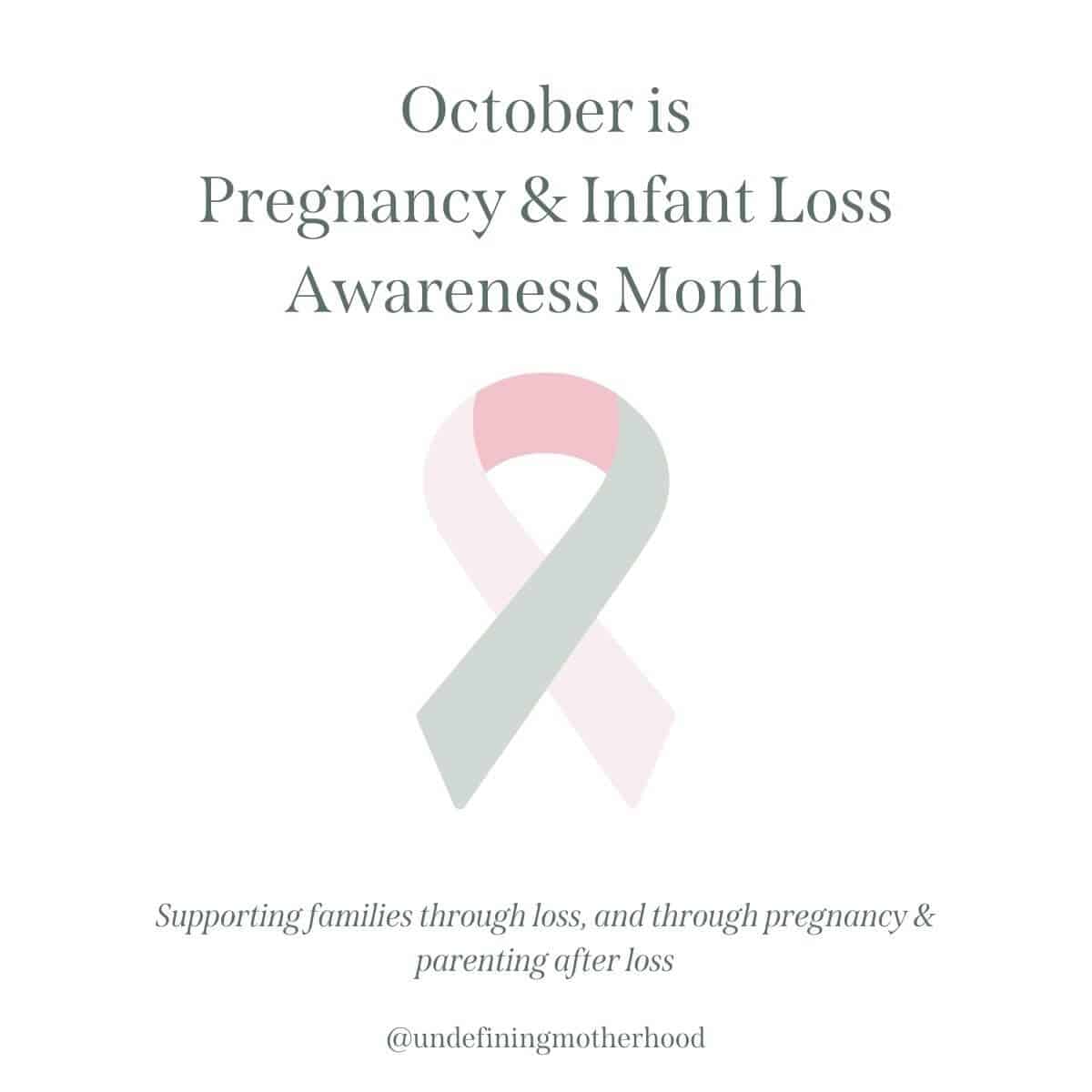Miscarriage and infant loss are so often stigmatized as “private” events that we’re left feeling awkward and uncomfortable around families who’ve been through it. If you’re here to find out what to say to someone who’s experienced pregnancy or infant loss, or how to appropriately honor their loss during this month of remembrance, you’re in the right place. The Undefining Motherhood team regularly writes about our own losses and the profound impact they’ve had on our lives.
I often find myself thinking about the Spring of 2021 when I lost a baby I hadn’t known I wanted. My miscarriage came out of the blue; I didn’t know I was pregnant, nor was I trying to conceive.
But emptiness and ache bloomed in me after my miscarriage, and it just sort of stayed there. Without anyone to talk to about it except my partner at the time, I had no real way to process. To be quite honest, it felt incredibly frustrating and hurtful to me that people assumed that, since I hadn’t been trying to get pregnant, my loss was easy to overlook.
Loss is so hard, friends. Even when it’s a miscarriage after an unplanned pregnancy, grief can consume you in such unexpected ways. No one–and I do mean no one–should ever make you feel like your pregnancy shouldn’t be mourned. Ultimately, this is why Pregnancy and Infant Loss Awareness Month is so important.
Our losses are valid, and our friends and family can and should learn how to grieve them alongside us. If you’re having trouble with friends and family who don’t know what to do in the wake of your loss, send them this article or gently suggest one of the following five ways they can support you. You deserve it.
We are so grateful to Fairhaven Health for sponsoring this article, which allows us to make sure that as many parents as possible are able to learn about this event and submit their children’s names to be read aloud at this year’s Wave of Light Event.

This site contains affiliate links, meaning that we earn a small commission for purchases made through our site. We only recommend products we personally use, love, or have thoroughly vetted.
- The Safe Space of Pregnancy and Infant Loss Awareness Month
- What is Pregnancy and Infant Loss Awareness Month?
- How to Support Loss Parents
- Additional Support Resources
The Safe Space of Pregnancy and Infant Loss Awareness Month
After my miscarriage in the spring of 2021, that summer passed in a frenzy — thanks to the COVID vaccine, I was finally able to see folks I hadn’t seen for over a year. I remember seeing them again and thinking: you haven’t acknowledged my loss. Why?
It seemed to me as if my friends and family were confused about what to say and were eager to hide behind the gaping black hole that was quarantine. I felt empty and unseen.
Fast forward to Fall of 2021 when I realized that there was a whole month dedicated to acknowledging the loss of babies who never made it safely into our arms.
While I’m not one for public acknowledgement myself (I’m more comfortable with private acknowledgement, and that’s an equally valid response to loss), it seemed fitting that families have this safe space to speak aloud the names of their children, to reflect on the lives they weren’t able to live, to pause and let the world grieve with them.
But so many people don’t understand HOW to grieve with parents who’ve lost children. One thing I love about what we do here at Undefining Motherhood is that we often help our readers understand that it’s okay to correct friends and family when they say hurtful things–or when they simply don’t say anything at all in the wake of loss.
As a grieving parent (and yes, you’re a parent even if you don’t have living children), you have every right to have your loss acknowledged and validated.
What is Pregnancy and Infant Loss Awareness Month?
First it’s important that we acknowledge that Pregnancy and Infant Loss Awareness Month is actually a nationally recognized and sanctioned month.
I know you might be thinking that I’m about to tell you about yet another month we have to acknowledge. I, too, am sick of the social media days that seem more like chances to broadcast your “perfect” life than to celebrate actual events or people.
But Pregnancy and Infant Loss Awareness Month is different.
Held in October, this is a month of remembrance that honors parents and families who have experienced miscarriage, chemical pregnancy, molar pregnancy, ectopic pregnancy, embryo loss, termination for medical reasons (TFMR), stillbirth, Sudden Infant Death Syndrome (SIDS), and other types of infant loss.
It’s a month dedicated to education, advocacy, remembrance, and awareness, and it’s actually a nationally recognized month designated by President Ronald Regan in 1988. The purpose of this month is twofold:
- Awareness: to increase the visibility of these heartbreaking experiences that are more common among families than we realize
- Remembrance: to honor grieving families and especially the children who are no longer here with us
How to Support Loss Parents
If you’re looking to support loss parents, keep the two tenets of Pregnancy and Infant Loss Awareness Month in mind: awareness and remembrance. Even if you don’t listen to anything I have to say past this moment, I’d love for you to take away one thing: do not ignore the loss.
And it would be even better if you took away one of these five ways to support loss parents:
1. Make a Personalized Comfort Meal or Start a Meal Train With the Parents’ Favorite Foods Listed
Okay, I know this one seems a bit obvious, but for many people who don’t know what to say, cooking can help you actively comfort parents who are going through loss without having to be eloquent or grandiose.
While you’re at it, go the extra mile.
Find out what foods the parents truly love, or what they like to eat when they need comforting, and find a way to make or order it for them. Personally, I love warm soups or southern-style grits when I’m sick or sad. Take the time to find out what the loss parents truly find comforting.
Not only will you spare them another frozen lasagna, but your thoughtfulness will go a long way in terms of helping them know that someone cares about what they are going through. Add a hand written card, and you’re really showering them with love.
2. Educate Yourself
Because what happens to women’s bodies during menstruation, birth, and miscarriage can still be such a taboo subject (even though that’s bull shi*t), it’s important to take a moment to really wrap your mind around what’s happened to your friend or loved one and what they might be dealing with physically and emotionally in the wake of miscarriage or infant loss.
The categories below are a great way to get acquainted with what your friend is going through. Do your research and make an effort to genuinely understand and empathize with them. We have tons of articles you can read through on many different types of loss:
General Miscarriage Support
- What to say to someone who had a miscarriage
- Providing miscarriage support
- Miscarriage gifts
- How to support someone after miscarriage
- Supporting a friend who had a miscarriage when you’re pregnant
- Stillbirth support
For Families Experiencing Loss
- Miscarriage support groups
- Coping with miscarriage grief
- Coping with infant loss
- Fathers dealing with miscarriage
Practical Miscarriage Support
- What to expect when miscarrying
- What to do after miscarriage
- Miscarriage books
- Trying to conceive after miscarriage
Miscarriage Awareness
- How to Prevent Miscarriage (Debunking the Myths)
- Types of Miscarriage
- Missed Miscarriage Stories
- Blighted Ovum Story
- Experiencing a missed miscarriage
- Miscarrying Twins
- Misoprostol Experience – the “miscarriage pill”
- Ectopic pregnancy story
- TFMR Story
- Termination for medical reasons
3. Attend an International Wave of Light Ceremony
One thing I love about Pregnancy and Infant Loss Awareness Month is the Wave of Light ceremony that generally takes place on October 15th. You can find a virtual or local Wave of Light Event and ask if they’d like for you to attend with them. If you’ve missed it this year, mark it on the calendar for next year.
They might not be comfortable attending themselves, but you can always show your support by attending and asking for their child’s name to be read if they are okay with this.
How Does a Wave of Light Ceremony Work?
At 7 pm wherever you live, you light a candle in remembrance of a specific child, or of children in general, lost to pregnancy or infant loss. You leave the candle burning until 8pm, at which point, you blow out your candle, and people in the next time zone light their candles for an hour. Many virtual Wave of Light ceremonies are held live, which makes them easy to attend.
The wave begins in the earliest time zone in countries like Samoa, then it passes to island nations like Fiji and the Aleutian Islands and continues across the globe for a full 24 hours.
As different time zones light and put out their candles, a symbolic wave of light goes up across the globe for 24 hours, honoring and remembering countless lives.
You can take part in the Wave of Light in the privacy of your own home (virtually or on your own), and it will mean a ton to your loved one if you do (just remember to ask their permission before submitting their child’s name).
And don’t feel like you have to attend anything you don’t want to attend. You can simply light a candle on October 15th (or any other day!) and send a picture and explanation to your friend. These gestures of remeberance can go a long way.
4. Help Out Around The House
This way to support loss parents is a lot like sending a meal: it’s more action than words, and that is absolutely okay. If you have time and/or financial resources, consider the following ways to help out around your loved one’s home:
- Ask to schedule appointments/make calls/arrangements for them
- Take their car through the wash
- Mow the lawn or send money for lawn service
- Stock their fridge and pantry
- Gift them a house cleaning
- Gift them laundry service like Poplin
- Ask what errands you can run
- Consider a Postpartum Meal Delivery Service gift, as parents who have experienced loss are still postpartum.
Keep in mind that loss parents are often going through physical trauma, and many could use help around the house. Having something done without having to ask is such a gift!
5. Talk About The Baby/Say Their Name
As I mentioned earlier, many people never mentioned my miscarriage to me even though they knew I had gone through it. A quick text would have gone so far in comforting me. Honestly, all you have to say is: “I can’t imagine what you are going through, but I am here for you in whatever way you need support.” That’s it!
It’s also important to remember that grief isn’t a linear process. Just because loss parents might join you for a beer or resume normal life in a few months doesn’t mean they aren’t still grieving. Take the time to check in with them months after their loss. Don’t expect lengthy conversations in return if they are more private, but trust me, as an introvert, I still appreciate it when people ask me how I am even if I can’t really respond.
If the parents named the child, ask about them by name in regular conversation if they are comfortable with you doing so (you can ask first). Hearing a child’s name can be so comforting. (Of course you’ll want to make sure this is okay with them first. I guarantee you that you’ll be the first person to ask).
Another good way to accomplish this is to send a miscarriage gift. There are many options you can personalize, such as art work, a comfy blanket personalized with the baby’s name, or a picture frame they can display a sonogram in.
Additional Support Resources
Let me just say that if you’re the loss parent looking for a way to help your friends and family understand what you need from them, we’re so glad you’re here.
And if you’re the friend or family member, thank you for taking the time to learn how to support your loved one.
Need more direction? We welcome you to use this website and our Facebook page to help guide you; this is why we exist! But we know that sometimes you need to reach out to multiple communities for information and support, and fortunately there are some really amazing organizations that exist for exactly this purpose.
Here are the organizations we’ve found most helpful for guidance during a loss journey:
1.Tommy’s is an UK organization that supports families of infant loss through early miscarriage research. They also have a ton of well-researched and accessible information available on their website.
2. First Candle is focused specifically on ending infant death during sleep (SIDS and other sleep-related infant deaths). They are committed to offering grieving families support and educating families on the importance of safe sleep practices.
3. Now I Lay Me Down to Sleep is an organization that brings together volunteer photographers and parents of infants who were born sleeping or who passed after birth. Giving parents photographs that they might not have had otherwise, NILMDTS is an incredible organization that makes sure that all families have memories of their children to look back on.
4. Unite provides free peer-to-peer grief support for families who have experienced infant loss. They also offer literature and educational support and training to help bereaved parents get the support they need.
How are you planning to acknowledge or raise awareness for Pregnancy and Infant Loss? We’d love to hear from you!
What is Pregnancy and Infant Loss Awareness Month?
Pregnancy and Infant Loss Awareness Month is a time to remember and honor lives lost to miscarriage, stillbirth, Sudden Infant Death Syndrome (SIDS), and other types of infant death. It is celebrated annually in October.
Why do we recognize Pregnancy and Infant Loss Awareness Month?
US President Ronald Reagan issued a proclamation in 1988, calling people to “observe this month with appropriate programs, ceremonies, and activities.” It honors lives lost too soon and the families who mourn those losses.
How should I participate in Pregnancy and Infant Loss Awareness Month?
Send a loving note or gift to people you know who have been affected by pregnancy or infant loss. You can also participate in the Wave of Light at 7pm local time on October 15.
When is Pregnancy and Infant Loss Awareness Month?
Since 1988, Pregnancy and Infant Loss Awareness Month has been celebrated each year during the month of October.











3 thoughts on “5 Ways to Support A Friend During Pregnancy and Infant Loss Awareness Month & Beyond”